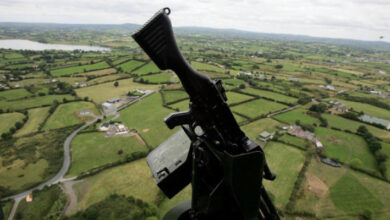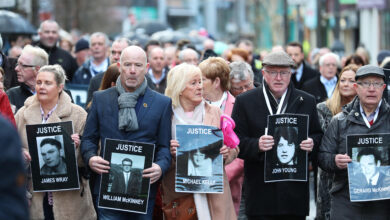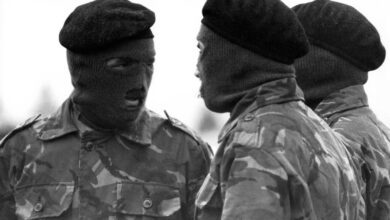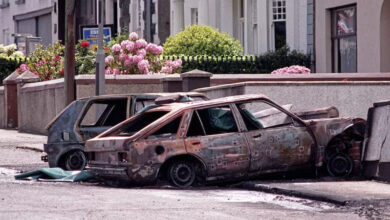Centinaia di “terroristi” nordirlandesi parlano delle torture della RUC
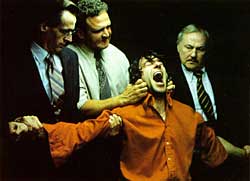
Hundreds of Northern Ireland ‘terrorists’ allege police torture
People convicted during the Troubles claim they suffered miscarriages of justice in non-jury Diplock courts
 Hundreds of men and women found guilty of terrorism offences in Northern Ireland during the Troubles are attempting to have their cases reopened, alleging that the confessions that led to their convictions were beaten out of them by police.
Hundreds of men and women found guilty of terrorism offences in Northern Ireland during the Troubles are attempting to have their cases reopened, alleging that the confessions that led to their convictions were beaten out of them by police.
The Criminal Cases Review Commission (CCRC), the body that investigates alleged miscarriages, has received applications from more than 200 people who argue that they fell victim to miscarriages of justice at the province’s non-jury courts.
So far the court of appeal in Belfast has heard 26 cases referred by the commission, and has overturned convictions in 24 of those. Solicitors in Belfast and Derry say they believe many more people will be applying to the commission in the near future.
As the appeals mount, a number of men who served as detectives with the Royal Ulster Constabulary (RUC) have told the Guardian how senior officers encouraged the systematic mistreatment of suspects at Castlereagh interrogation centre in east Belfast, and elsewhere, after the establishment of the Diplock courts in 1973.
They say they took full advantage of the vague wording of emergency legislation in Northern Ireland which allowed the courts to admit confessions as evidence, providing there was no evidence they had been obtained through the use of torture, or inhuman or degrading treatment. One retired detective commented: “Do repeated slaps around the face amount to torture? What about an occasional kick in the balls?”
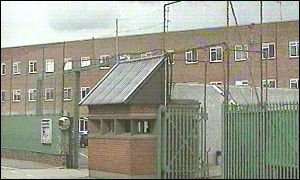 In a sign that the courts are now accepting that such tactics were an integral part of policing during the Troubles, a number of people who pleaded guilty on legal advice after signing so-called confessions have succeeded in having their convictions overturned.
In a sign that the courts are now accepting that such tactics were an integral part of policing during the Troubles, a number of people who pleaded guilty on legal advice after signing so-called confessions have succeeded in having their convictions overturned.
In addition to the 26 cases heard by the court of appeal, a further seven cases are waiting to be heard, and 80-odd are still being considered by the CCRC. These include 47 people who were juveniles at the time of their conviction.
A number of those whose convictions have been overturned have been able to establish that there were grounds to suspect that the police officers who they alleged were responsible for their own mistreatment had beaten other suspected paramilitaries.
Two men from Belfast, who were arrested in 1976 as boys aged 14 and 16, served nine years in jail after being advised to plead guilty to the murder of a Catholic accountant who was shot dead in his bed. They were able to show that their confessions did not fit with the crime scene, or the pathologist’s report on the victim’s injuries, or with statements by witnesses who heard the shots.
Another man, from Derry, confessed to a series of terrorism offences after being arrested in 1978 at the age of 16 for questioning about the murder of an RUC officer, and says he was then instructed by his lawyer to plead guilty. He has been able to show that the court ignored alibi evidence that proved he was 75 miles away inside a secure children’s home at the time that most of the crimes were committed. He had also confessed to an attempted hijacking which, a subsequent police reported showed, had never taken place.
At this man’s appeal, the court heard that after he had been sentenced to a period of borstal training his lawyer advised him against lodging an appeal on the grounds that he had received a “good result”.
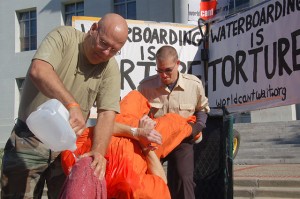 Among those whose cases have been referred to the appeal court by the CCRC is a man from west Belfast who says he was forced to sign a false confession to murder after being waterboarded by soldiers from the Parachute Regiment. The commission says it has taken up the case because of doubts about “the admissibility and reliability” of the man’s confession, and says it believes “there is a real possibility” his conviction will be quashed. Some of the new evidence unearthed by the CCRC is being withheld from the man and his lawyers, however, at the insistence of the Ministry of Defence.
Among those whose cases have been referred to the appeal court by the CCRC is a man from west Belfast who says he was forced to sign a false confession to murder after being waterboarded by soldiers from the Parachute Regiment. The commission says it has taken up the case because of doubts about “the admissibility and reliability” of the man’s confession, and says it believes “there is a real possibility” his conviction will be quashed. Some of the new evidence unearthed by the CCRC is being withheld from the man and his lawyers, however, at the insistence of the Ministry of Defence.
Almost all the men and women who are appealing were convicted by the controversial no-jury Diplock courts that heard terrorism cases in Northern Ireland between 1973 and 2007. Established after a number of jury members were intimidated and potential witnesses murdered, they could convict on the basis of a confession alone, and defendants were expected to prove any claim that a confession had been coerced.
During the course of the Troubles several police doctors came forward to complain that terrorism suspects were being beaten during interrogation, and that the courts were dismissing their expert evidence.
Eamonn McDermott, who served 16 years in jail after confessing to the murder of a Catholic RUC detective in Derry in 1977 – and whose conviction was overturned 30 years later – said: “What I find interesting is that the first time the Diplock system is scrutinised by any sort of outside agency, it starts crumbling. I think there was quite a lot of surprise at the CCRC at what was acceptable at the time.”
Few people from Northern Ireland approached the CCRC during the early years of its existence, with the result that it staged a conference in the province in 2004 aimed at raising awareness and promoting public confidence in its work. A small trickle of applications followed, but that has recently swollen.
Some of those whose convictions have already been quashed have received substantial sums in compensation. Others, however, have not, with the Northern Ireland Office arguing that there is no obligation for them to be compensated. A number are challenging this refusal through the courts.

